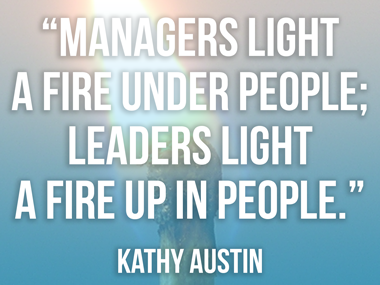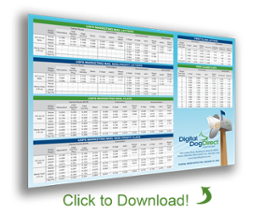As we close out 2014 and look to the New Year, leaders in every industry and workplace should consider changes they must make to keep up in our fast-paced world. Of all of the key things leaders should consider, one stands out amongst the rest as a must for 2015: autonomy. 
Employee autonomy surfaced as an innovative concept in some organizations (think Google) over the past decade, but today it’s more of a necessity than a choice.

The working population has different stressors and motivators than in years past. As a leader, take action to put autonomous initiatives into your workplace. Here are 5 ways to get started:
Enable Employees
Providing your employees and coworkers with the means to succeed is a mark, and responsibility, of a leader. Beyond providing a professional and motivating workplace, annual reviews and encouragement, and other expected obligations, give thought to a more personalized approach in 2015.
To enable your employees is to know their strengths and play to them. Gallup, a news provider to business leaders, developed a Strengths Orientation Index to discover what degree an employee’s strengths are cultivated based on these 4 statements:
- Every week, I set goals and expectations based on my strengths.
- I can name the strengths of five people I work with.
- In the last three months, my supervisor and I have had a meaningful discussion about my strengths.
- My organization is committed to building the strengths of each associate.
Only 3% of the American working population can say they strongly agree with those four points.  Strive to reach a higher percentage in your office. When employees feel they are using their strengths, they are happier and “are more likely to respond with increased discretionary effort, a stronger work ethic, and more enthusiasm and commitment.” (Gallup.com)
Strive to reach a higher percentage in your office. When employees feel they are using their strengths, they are happier and “are more likely to respond with increased discretionary effort, a stronger work ethic, and more enthusiasm and commitment.” (Gallup.com)
Provide a Stable Environment
The instability of our economic, global, and financial state will continue into 2015. It’s unnerving and sends ripples of doubt into other aspects of our lives where it doesn’t belong—sometimes into our homes, relationships, and workplace. A good leader in the New Year will foster an environment of consistency so employees know that the safety net will be there when they want to take risks.
Simon Sinek noted this importance in 2014 when he discussed the threats of changing technologies and hungry competition. “They’re constant and they’re not going away,” he says. “The only variable are the conditions inside the organization. That’s where leadership matters, because it’s the leader who sets the tone.” (Ted.com)
As a leader, it’s important to set a dependable tone with clear and consistent expectations. Not only will it enable your employees to work more confidently, it will make the workday more enjoyable for everyone—including you.
Reconsider the 9 to 5
There are many factors contributing to the impending demise of the set 40-hour workweek: round-the-clock demand of technology, a greater focus on physical wellness and mental wellbeing, and the entrance of Millennials to the workforce. Today’s employee needs flexibility to juggle their work-life balance and requiring a set time to clock in and clock out is not appealing—nor is it effective.
A recent study funded by the National Institutes of Health (NIH) and Centers for Disease Control and Prevention (CDC) found that employees with flextime felt a “reduction in the tension between their work and family life.” (HuffingtonPost.com)
In addition, “JP Morgan Chase found that 95% of employees working in an environment where the manager is sensitive to work and personal life—including informal flexibility—feel motivated to exceed.” (WorkplaceFlexibility.bc.edu) 
This doesn’t mean giving employees a 0 hour work contract; but do consider how flextime can assist with your company’s goals. If you are a 9 to 5 workplace, institute a set amount of flextime for your employees by asking them to dedicate a specific percentage of the workweek to an independent project aligned with the company’s goals, similar to Google’s 20% rule.
If your workplace doesn’t need to be 9 to 5, think about how flexibility could make a difference in your colleagues’ lives and perhaps institute some new flex rules in 2015.
Personal Branding
You know your company’s brand, goals, and means of communication. But do you nurture your personal brand? If you haven’t yet taken an audit of your online presence, cleaned up your LinkedIn properties, or participated in blogging or social forums by sharing unique information—you’ve got work to do.
We’re in the age of selfies and YouTube stars where personal branding spans across all ages, demographics, and contexts. Now consider your colleagues’ context. Where are your employees getting information, webinars, and tutorials? That’s where you need to be as well. An active personal brand online establishes your personal voice as a leading professional in your field and your coworkers will take notice of this. You’ll be an inspiration and motivator by walking the walk and participating in the online information exchange.
Encourage your employees to do the same and have a personal brand aligned with, but separate from, your organization. This empowers them to foster independent creativity and initiative, and also demonstrates the company’s number of engaged employees on a public platform.
Be Meaningful
Martin Flick, chief executive of Olive, a communications technology firm says, “work is increasingly becoming something you do, not somewhere you go.” How true this is for so many of today’s employees. And we’re not just talking about Millennials, who are very focused on finding meaningful work, we’re talking all generations.
“More than 4.5 million people ages 50 to 70 are already in encore careers that combine personal meaning, continued income, and social impact, and 88% of Millennials are seeking work with a greater purpose.” (Encore Research) 
Purpose is more important than commute, hours, and even pay to some employees. There are a few explanations for this but one speaks to the need of feeling autonomous. Knowing that you have control over your future and your direct contribution to that is knowing that you can work with autonomy.
So, think—what impact do you have on society’s future? What impact do your employees and consumers have on society’s future? Think beyond bottom lines and revenue and more about personal fulfillment. Once you find that, reference it in every decision you make and encourage your employees to do the same.



Comments